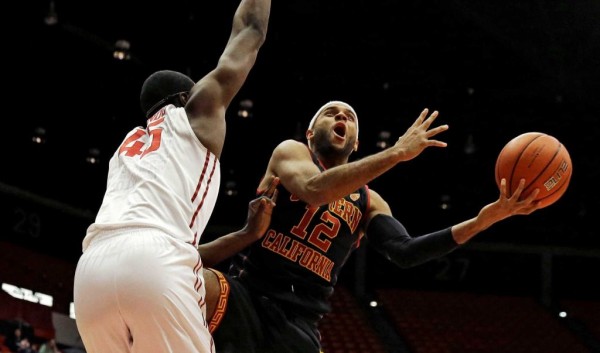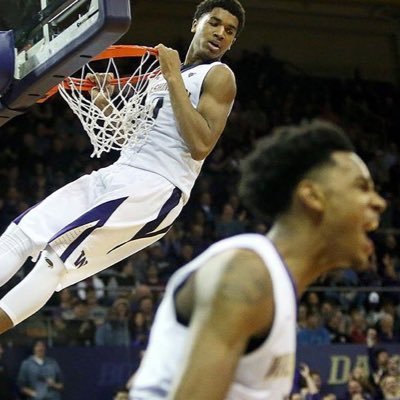Washington’s Big Comeback Win Says More About USC
Posted by Andrew Murawa on January 4th, 2016For something like 25 minutes on Sunday afternoon, this post was going to be about moving USC from contending for an NCAA Tournament invitation to a potential sleeper among the top of the Pac-12 race. The Trojans were up 61-42 at Washington and appeared to be headed for an opening weekend road sweep. They had scored on seven of their first eight second half possessions, mixing dunks in transition with threes, sharing the ball and locking in defensively. But when junior guard Julian Jacobs came out of the game with an ankle injury at the 16:18 mark, things quickly went off the rails.
From that point forward, the Huskies outscored Andy Enfield’s bunch by a score of 45-24. Until he called his team’s final timeout with 6:58 remaining (20 possessions later), the Trojans managed a grand total of 10 measly points, a stretch that featured eight turnovers and five missed layups on the offensive end, along with six layups and five defensive rebounds allowed on the defensive end. Worse yet, after appearing to have regained their poise and settled into a workable seven-point lead with two minutes left, the Trojans melted down again. Washington finished the game on a 9-0 run as sophomore point guard Jordan McLaughlin turned it over twice more and the Huskies grabbed three crucial offensive boards, including one from senior guard Andrew Andrews that became the game-winning bucket. All told, it was a thrilling comeback 87-85 win for the Huskies and a demoralizing failure for the Trojans.
That said, it’s still just one game in a long season. Aside from all the gruesome details about USC’s blown lead, what can we take away from the game? At first blush, the storyline in Seattle seemed to be more about the losers than the victors. This is program that has won a total of six Pac-12 games in 40 tries under Enfield. Only two of those wins have come on the road, and both of those came against Washington State (once at the end of the 2013-14 season; the other on Friday night). In other words, this is not a team with a lot of experience at winning, much less winning in tough environments. Throw in the injury to Jacobs that left USC without arguably its most important player and when things started to go south, they did so in a hurry. Jacobs — aside from being an athletic scoring threat, the team’s most secure ball-handler, and a solid perimeter defender — is also the team’s most veteran presence, capable of acting as a calming influence. When McLaughlin got flustered during the Huskies’ big 26-10 run, he typically would have had Jacobs there to settle things down. No such luck on Sunday, and there were times down the stretch when the Trojans looked to freshman Bennie Boatwright, of all people, to handle the ball and create offense in the half-court. Needless to say, that decision did not end well.
In any comeback win of this size, of course, there are two sides at work. The Trojans certainly made a lot of mistakes down the stretch, but plenty of credit needs to go to the Huskies. Lorenzo Romar ratcheted up his team’s defensive pressure, using his long and athletic pups to ugly things up and force McLaughlin out of his rhythm. It worked. Andrews, David Crisp, Dejounte Murray, and even bigs Matisse Thybulle and Marquese Chriss, extended their pressure, forced some turnovers and, along with some serious work on the offensive glass (22 offensive boards, 37.9% OR), found their way to easy buckets. Whereas the Trojans were confused and tentative, the Huskies were aggressive and smart.
Washington turns it over too much on the offensive end and fouls too much on the defensive end to become a legitimate threat for an upper-division conference finish this year, but the Huskies are young, long, athletic and fun. And if this team sticks around in a recognizable form for the next couple years (and really, there’s no reason why it shouldn’t), Romar is building a platform upon which his program can mount a run to the upper reaches of the Pac-12 and return to the heyday of Washington basketball. They are likely to struggle on the road this season, but all of these experiences should act as educational building blocks for the future.
And then there’s the Trojans — let’s not bury this team just yet. We’re going to have to see what happens with the Jacobs injury before speculating too much — especially with the Arizona schools traveling to Los Angeles this week — but any chance at this team living up to its potential includes his presence on the court as much as possible. Assuming his absence is limited, this is still a team with a lot of balance among its rotation. Enfield has six guys (Jacobs, McLaughlin, Boatwright, Katin Reinhardt, Nikola Jovanovic and Elijah Stewart) across all positions who can put up 20 points on any given night. He also has role players like Chimezie Metu and Darion Clark ready to do his dirty work.
Furthermore, USC is well-balanced between offense and defense and Enfield has shown significant growth in both his player development and in-game X’s and O’s (the evidence presented at the end of this game notwithstanding). Sure, we’d love to see another “trustable” ball-handling guard emerge on this team other than Jacobs — possibly Reinhardt — and the Trojans could stand to get to the line more often. But this team has all the trappings of a scary matchup in the NCAA Tournament. If taking a rough loss like Sunday’s debacle in Seattle does anything to toughen USC and teach it how to better perform in tight games, there’s no reason this can’t still become a breakout season in Los Angeles.












































